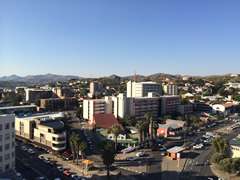July 16, 2019
Namibia, a country in southwest Africa, gained independence from South Africa in 1990 to become the second youngest independent nation in the continent. The country boasts vast natural splendors from ancient times. About 40 percent of its land is designated as national parks and nature reserves, including the Namib Sand Sea, a World Natural Heritage site on the Atlantic coast from which the country derives its name.
Namibia is also known as an African rugby country along with South Africa. Its national team will be participating in its sixth Rugby World Cup in a row in the tournament set to be held in Japan in September this year.
Namibia is one of the least densely populated countries in the world. Approximately 2.6 million people live there on land roughly double the size of Japan. The country is blessed with underground resources, such as diamond and uranium, and the national per capita income stands at 5,000 dollars, making it an upper middle-income country. However, the society is divided into two parts, with a small number of wealthy white people accounting for 70 percent of the economy and an overwhelming number of poor people struggling with a high unemployment rate.
JICA proposed and continues to support a "Project on Master Plan for Development of an International Logistics Hub" in Namibia by leveraging the country's location. Our objective is to help resolve economic disparity in Namibia by developing its mineral resource-dependent industrial structure. We also actively support educational activities with the help of volunteers.

Windhoek, the capital of Namibia




scroll